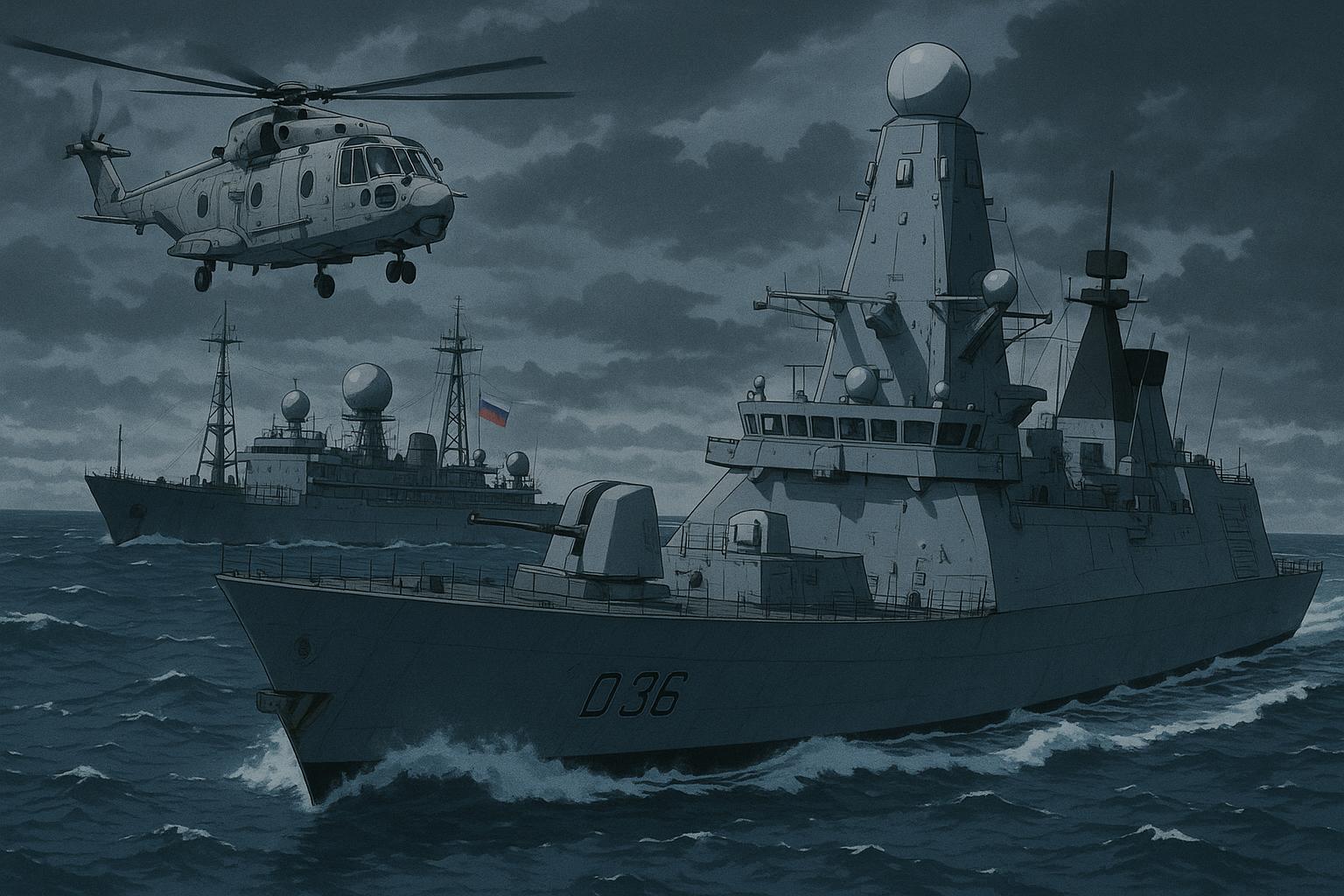The Royal Navy has closely tracked a Russian intelligence-gathering ship loitering off Scotland, the second such incident this month, while raising alarm over Russia’s shadow fleet of ageing oil tankers navigating UK waters to circumvent sanctions, posing serious environmental and security threats.
A Russian intelligence-gathering ship, the Yuri Ivanov, has sparked significant concern as it was spotted loitering off the coast of Scotland, marking the second such incident this month. This heightened activity prompted a swift response from the Royal Navy, which deployed warships and helicopters to monitor the situation closely. The HMS Dragon, a Type 45 destroyer based in Portsmouth, took the lead, launching Merlin helicopters to gather aerial intelligence until the Yuri Ivanov headed north towards its home base in the Arctic.
This incident occurred shortly after the major NATO exercise Formidable Shield concluded nearby, underscoring the ongoing tension in the region. The Royal Navy’s proactive response is seen as a crucial component of its strategy to safeguard national security, particularly in light of recent increases in Russian naval activity. Lieutenant Commander Craig Clark of HMS Ledbury emphasised the significance of escorting Russian vessels, stating that it serves as a clear indication of the UK’s commitment to maintaining maritime security.
However, the maritime concerns extend beyond individual Russian ships. Increasingly, a network of vessels known as Russia’s “shadow fleet” poses a more insidious threat. These oil tankers are often old and poorly maintained, facilitating the circumvention of Western sanctions imposed after Russia’s invasion of Ukraine. With estimates suggesting that around 400 tankers are operating under this shading strategy, their movement represents a potential environmental disaster as they traverse UK waters and the broader international maritime landscape.
Reports highlight the precarious conditions under which this shadow fleet operates. These vessels frequently lack proper insurance and safety certifications, as they re-register under obscure ownership structures to evade scrutiny. Recent investigations by the Kyiv School of Economics Institute illustrate a troubling trend of older ships being acquired at lower costs while ignoring key maritime safety laws. This negligence raises urgent questions about the risk levels posed to marine ecosystems and coastal communities.
Members of Parliament have voiced their concerns regarding the shadow fleet’s implications for the environment. Labour representatives have called for the establishment of “shadow-free” zones in British waters to mitigate the risks these vessels bring. According to MP Tim Roca, approximately ten such tankers traverse the English Channel daily, contributing to a growing chorus of calls for enhanced maritime safety enforcement.
A significant investigation revealed the diverse methods employed by Russia to maintain its oil exports despite sanctions, including sophisticated techniques to obscure the ownership and operational details of these ships. Such tactics complicate efforts to monitor and impose regulations, leading environmental experts to warn that a major disaster could be simply a matter of time.
Meanwhile, the Royal Navy remains vigilant, having recently monitored other Russian vessels in UK waters, highlighting a persistent geopolitical challenge. With the ongoing scrutiny of Russia’s maritime operations and growing international focus on environmental safety, the situation demands a robust response to safeguard both national security and ecological integrity. As the tides of maritime conflict swell, the imperative for coordinated action grows sharper, echoing the complexities of contemporary geopolitics.
 Reference Map:
Reference Map:
- Paragraph 1 – [1], [2]
- Paragraph 2 – [1], [4], [5]
- Paragraph 3 – [3], [6]
- Paragraph 4 – [3], [4]
- Paragraph 5 – [3], [5], [6]
- Paragraph 6 – [1], [5]
- Paragraph 7 – [6]
Source: Noah Wire Services
- https://metro.co.uk/2025/05/29/royal-navy-scrambled-monitor-russian-ship-loitering-uk-waters-23281809/ – Please view link – unable to able to access data
- https://www.royalnavy.mod.uk/news/2025/march/25/250325-royal-navy-monitors-russian-survey-and-task-group-in-uk-waters – In March 2025, the Royal Navy deployed HMS Cattistock and a Wildcat helicopter to monitor the Russian survey ship Admiral Vladimirskiy as it traversed the Strait of Dover and the English Channel. The operation aimed to ensure the security of UK waters by closely observing the vessel’s movements through busy shipping lanes until it exited the Channel near the Brest peninsula. This action underscores the Royal Navy’s commitment to safeguarding national security and maintaining vigilance over maritime activities in the region.
- https://www.reuters.com/markets/commodities/key-points-about-russias-shadow-fleet-oil-tankers-2025-05-15/ – Reuters reports that Russia has established a ‘shadow fleet’ of oil tankers to circumvent Western sanctions imposed after its invasion of Ukraine. This fleet comprises aging vessels with obscure ownership, lacking proper insurance and safety certifications. These ships often operate outside international regulations, employing methods such as ship-to-ship transfers and spoofed location data. Despite sanctions, Russia continues to export oil, raising environmental and safety concerns due to the fleet’s condition and operational practices.
- https://www.lemonde.fr/en/les-decodeurs/article/2024/10/30/russia-s-ghost-fleets-a-strategic-asset-for-selling-sanctioned-oil_6731039_8.html – Le Monde discusses Russia’s use of ‘ghost fleets’ to secretly sell its oil and evade Western sanctions. These fleets, consisting of up to 600 ships, represent a significant portion of Russia’s maritime oil exports. They employ sophisticated concealment techniques, such as changing ownership and flags, falsifying position data, and turning off transponders. This strategy not only evades sanctions but also poses substantial environmental risks due to the poor condition of the vessels and their unregulated operations.
- https://apnews.com/article/76b66900d599d6e49692643674907fc0 – The Associated Press reports that Russia has been using a ‘shadow fleet’ of older and less transparent tankers to evade Western sanctions and keep its oil revenue flowing despite the G7’s price cap of $60 per barrel. The shadow fleet consists of over 400 tankers, many owned by opaque entities or registered in non-sanctioning countries, and some directly by Russia’s Sovcomflot. This fleet helps avoid sanctions that restrict Western insurers from covering oil sales above the cap, allowing Russia to maintain and even increase its oil income to fund the war against Ukraine. Concerns have been raised about the environmental and safety risks posed by these aging vessels, and there have been efforts to monitor and sanction them further. Despite measures, Russia’s oil income continues to support its economy and military expenditures.
- https://www.ft.com/content/b9dee3f3-c2f8-4aa1-b0d9-d207f815b6e5 – The Financial Times details how Russia’s ‘shadow fleet’ involves a network of over 400 aging oil tankers transporting approximately 4 million barrels of oil daily, bypassing Western sanctions designed to limit Kremlin revenues. These vessels are bought through complex offshore structures, making ownership and accountability obscure. Investigations revealed Lukoil’s involvement in financing the acquisition of second-hand tankers via its shipping arm, Eiger Shipping DMCC. British accountant John Ormerod played a key role, setting up various entities in the Marshall and Cook Islands to purchase these vessels, allegedly following legal counsel to avoid sanction violations. Dubai-based shipping magnate Muhammad Tahir Lakhani’s companies managed the vessels, although some entities faced sanctions by the UK and EU. The shadow fleet’s advanced age and lack of adequate insurance pose significant environmental risks, with Western entities increasingly scrutinizing and sanctioning facilitators involved. This expansive, clandestine operation exemplifies efforts by Russian entities to evade sanctions and sustain oil revenue.
- https://www.royalnavy.mod.uk/news/2025/january/22/250122-royal-navy-tracks-russian-spy-ship-in-waters-close-to-the-uk – In January 2025, the Royal Navy tracked the Russian spy ship Yantar as it sailed through waters close to the UK. HMS Somerset and HMS Tyne monitored the vessel, which is believed to be used by the Russian Navy for intelligence gathering. The operation involved covertly launching a Merlin helicopter to locate Yantar as it made its way north towards the English Channel. This action highlights the Royal Navy’s commitment to protecting the UK’s sovereignty and critical underwater infrastructure.













